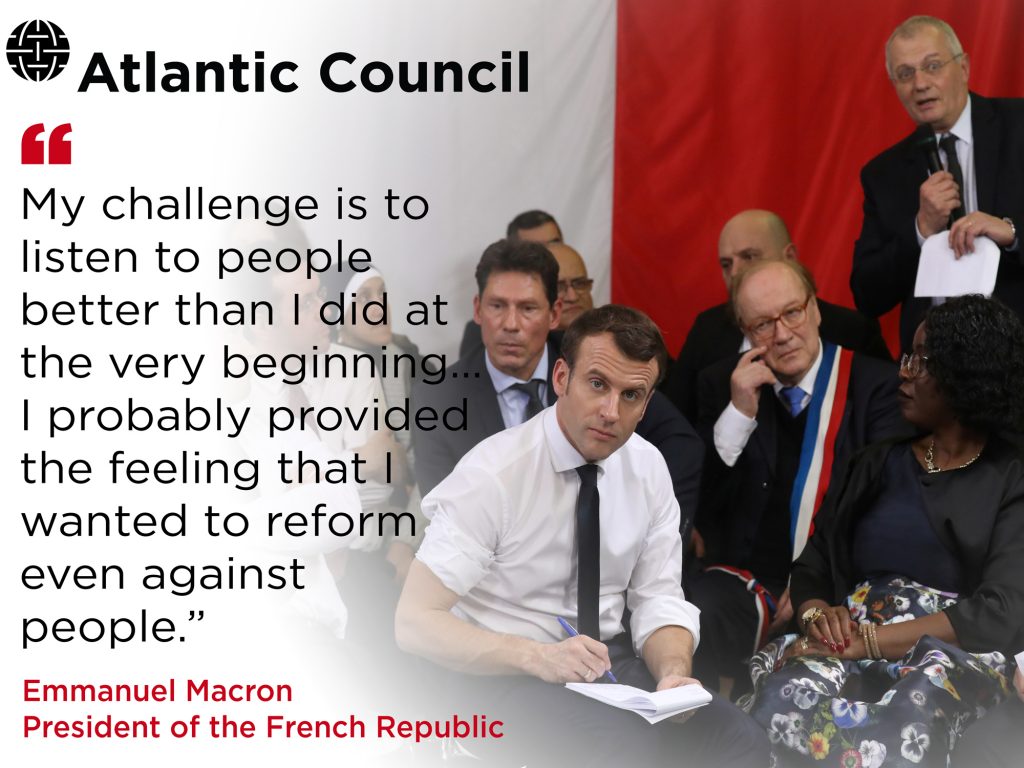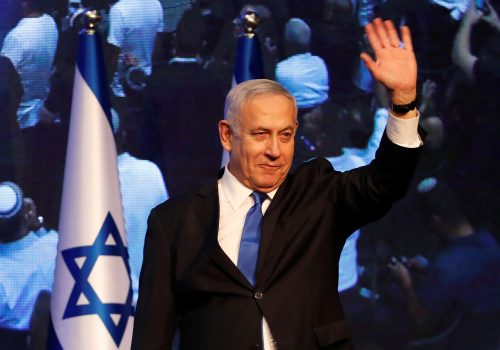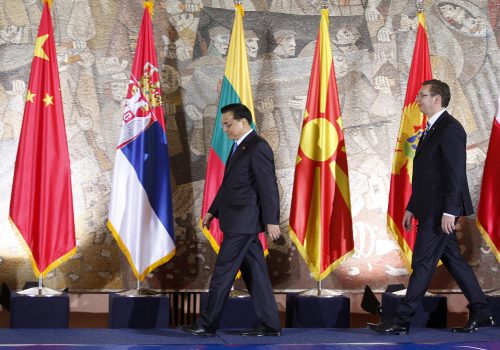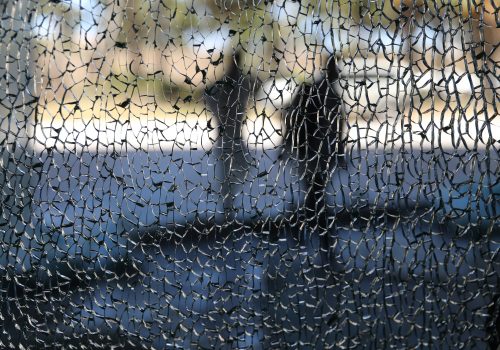Trump’s Iran test: Nerves and vision
Key Points
- Iran’s audacious drone and cruise missile attack last weekend on Saudi Arabia’s oil producing facilities has provided the most critical test yet for the Trump administration’s foreign policy.
- A successful response will require both nerves and vision in a world of emboldened adversaries and perplexed allies.
- Whatever course Trump chooses by way of response, he should at the same time revive his administration’s efforts to create the Middle East Security Architecture, or MESA.
Iran’s audacious drone and cruise missile attack last weekend on Saudi Arabia’s oil producing facilities has provided the most critical test yet for the Trump administration’s foreign policy. A successful response will require both nerves and vision in a world of emboldened adversaries and perplexed allies.
The nerves will be necessary to navigate the short term demands for action, without falling into the Iranian trap of triggering a counterproductive military response that could strengthen the regime at home and abroad. Strategic vision could leverage the crisis to advance one of the loftiest (but least developed) Trump foreign policy initiatives: A Middle East security architecture to counter Iran and promote regional cooperation.
At the same time, the Iranian attack – both US and Saudi officials agree no other party could be responsible – will test the Trump administration’s understanding of regional stability, energy markets and what it takes to defend Middle Eastern resources and secure global supply.
Energy markets will see in the US response the clearest sign yet of whether US energy self-sufficiency over time will result in a reduced willingness to provide security guarantees to Gulf allies. If that’s the case, traders should be concerned not just about current prices but also build in risk premiums due to increased Mideast supply vulnerability.
As the United Nations General Assembly opens on Tuesday, the attack also puts into stark relief how dramatically the world has changed from the time of the last comparable Middle East oil supply shock driven by military action, when Saddam Hussein’s Iraq invaded Kuwait back in August 1990.
For that fleeting moment, it seemed as though the United States would be presiding for some time to come over a rules-based “New World Order.” The Cold War had ended, the Soviet Union was collapsing, and democracies were ascendant.
US President George HW Bush constructed an unprecedented global coalition, acting with the blessing of the UN Security Council, which ultimately defended Saudi Arabia, defeated Iraq and liberated Kuwait. Operation Desert Storm, a 42-day military undertaking that deployed a 39-country coalition, raised hopes that a more promising era had dawned where the global community could rally better against international outlaws and for the common good.
Fast-forward to today’s New World Disorder.
Get the Inflection Points newsletter
Subscribe to Frederick Kempe’s weekly Inflection Points column, which focuses on the global challenges facing the United States and how to best address them.
The Trump administration won’t find it easy to frame an effective response, one that would at the same time avoid war, rally the world community, defend global oil supplies, punish and then deter Iran, and reassure Mideast allies. The obstacles are both self-inflicted – uncertain allies reeling from trade and other disputes with the Trump administration – and unavoidable in a world shaped by a new era of major power competition with China and Russia, both Iran supporters.
President Trump on Friday approved the deployment of additional defense forces to Saudi Arabia and the acceleration of transferring military equipment to Riyadh and the UAE. He also ratcheted up sanctions with a new round against Iran’s national bank while his advisers review a list of military targets for a potential retaliatory strike. “We’ve never done it at this level,” he said of the sanctions, while indicating he had “plenty of time” to respond further.
“The Iranians – and other opponents of the United States in the region – have every reason to believe that Trump speaks loudly and carries a nonexistent stick,” writes Stephen A. Cook of the Council on Foreign Relations in Foreign Policy. He argues that if the US had responded to Iran’s shooting down of the American drone on June 20 that the Iranians might “have thought twice” before their latest attacks.
What’s in question, he says, is the long-standing, three-part rationale for US engagement in the Middle East: ensuring energy supplies, securing Israel and making sure no state or group of countries can endanger the other two interests.
Assuming Iran was responsible for the attacks, “the Iranians are testing the entire rationale for U.S. investment in the Middle East over the last 70 years,” says Cook. “If Trump does not respond militarily, the United States should just pack up and go home.”
Not so fast.
A far better response would be to understand that Iran is lashing out more from a position of weakness than one of strength. That requires a cool, measured response that will continue to sap the Iranian regime’s resources while avoiding a feel-good military strike that could inadvertently strengthen Iran’s autocrats at home and shore up their support globally.
“The regime is wounded and thus defensive, it is cornered and thus aggressive,” says Kirsten Fontenrose of the Atlantic Council, who most recently served as senior director for Gulf Affairs in the Trump administration’s White House. “It feels increasingly squeezed financially, pressured socially at home, and let down politically by the European inability to move (Trump). It must escalate…or escalate.”
Whatever course Trump chooses by way of response, he should at the same time revive his administration’s efforts to create the Middle East Security Architecture, or MESA.
“The initial proposal,” writes James Jay Carafano in the National Interest, “bundled a commitment to collective defense with: a structure for cooperative defense planning; a dispute resolution mechanism to resolve disputes between members, and a free trade network. Washington’s proposal was: if all the Gulf states signed up, the United States would back stop the agreement and join as a member itself.”
An army of skeptics said this sounded too much like a NATO for the region, unachievable both due to Mideast divisions and US unwillingness to provide security guarantees. Over time, the concept has been watered down and gutted of the security aspects the region most needs. If the idea had got off the ground earlier, Carafano reckons “the recent attack on Saudi oil production might never have happened. Iran could have been deterred from messing with its neighbors.”
No time will be better than this moment to revive the original MESA proposal, which doesn’t require a NATO-like US security guarantee, as a long-term solution for a region the United States can’t leave but doesn’t want to continue to defend.
US energy self-sufficiency would be a flawed reason to exit the Middle East, as oil markets and their vulnerabilities are global. The West also has learned that it can’t wall itself off from the region’s security problems, which bleed over borders sometimes as migrants, sometimes in extremist violence.
“Never let a good crisis go to waste,” said Winston Churchill.
It took World War II and more than 20 million dead before France and Germany settled their differences, and the US helped establish NATO. How fortunate would it be if the Mideast could achieve something similar before such scale of tragedy?
This article originally appeared on CNBC.com.
Frederick Kempe is president and chief executive officer of the Atlantic Council. You can follow him on Twitter @FredKempe.
Must-Reads from a World in Transition
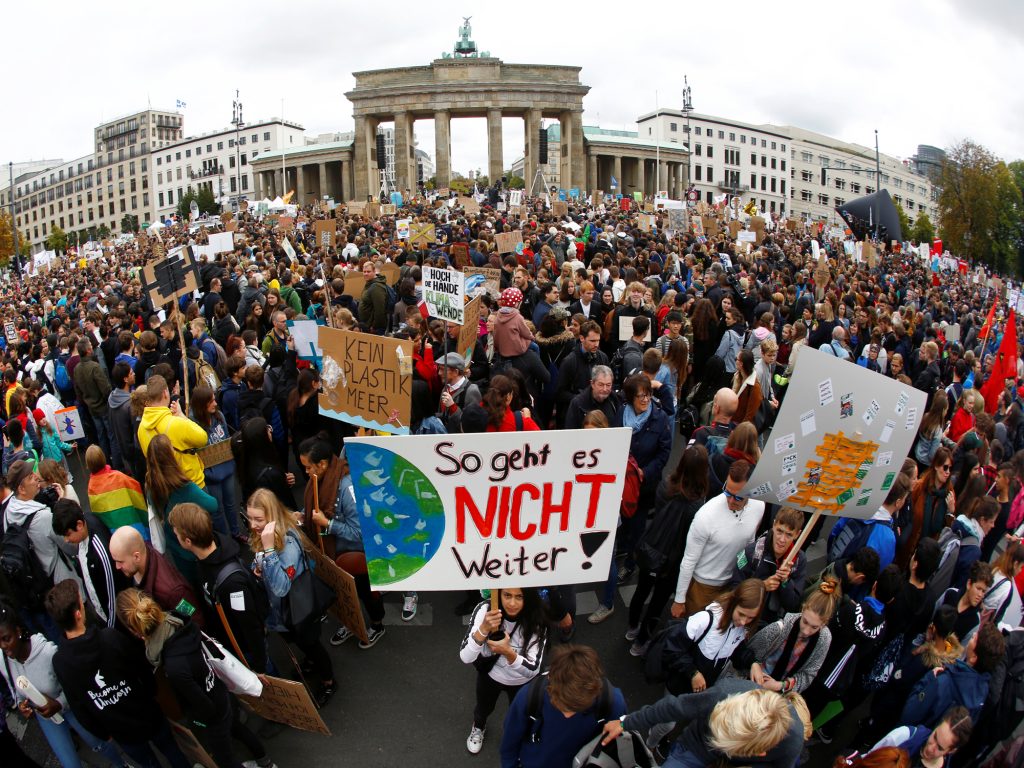
This week’s top reads drill down on Iran’s oil attack and raise the curtain on China’s growing role inside the UN. Also, don’t miss this week’s Economist cover on how to tackle climate change without killing capitalism. This week’s must-read is Vivienne Walt’s profile of French President Macron in Time Magazine as he navigates “Death Valley.”
#1 SAUDI-IRAN TENSIONS
A Credibility Test for U.S. -Saudi Defense Relations and Iran Deterrence
Michael Knights / WASHINGTON INSTITUTE FOR NEAR EAST POLICY
Talks in Riyadh on Iran: What happens next?T
Kirsten Fontenrose / ATLANTIC COUNCIL
Michael Knights of the Washington Institute lays out the most compelling set of suggestions I’ve read for how Washington on Iran can “signal firm consequences in the short term while preserving the option for future military action.”
They include demonstrating the Iran link to the Saudi attack in a way that is beyond doubt, building coalitions and getting the Saudis to use their clout with Russia and China to schedule an emergency session of the UN Security Council on the attack. For good measure, he believes US should ratchet up covert action and plan collective defense measures to shore up Saudi air defense.Read More →
Kirsten Fontenrose, a former senior director at the National Security Council and newest member of the Atlantic Council’s Middle East Program, writes:
“The conversation will move to the president’s likely preferred course of action, a slate of offensive cyber, influence operations, and covert action to disrupt Iran’s missile capabilities and shipping of oil and transfer of arms and funds to proxies. Since no American was injured in the attack, this option will be as aggressive as a Congress critical of Saudi Arabia will allow.” Read More →
#2 CHINA AND THE UN
Coming Soon to the United Nations: Chinese Leadership and Authoritarian Values
Kristine Lee / FOREIGN AFFAIRS
As world leaders gather for the annual UN General Assembly in New York, Kristine Lee takes a smart look in Foreign Affairs at one of the most profound global changes: China’s growing influence within international bodies and its threat to US values and interests.
“Eager to expand its influence on the world stage in ways that serve its interests,” she writes, “China has placed considerable resources behind an effort to present its leadership at the UN as a nimbler, more dynamic alternative to that of the United States. To achieve that, China has positioned its officials to head up four of the UN’s powerful, specialized agencies, while the US has only one. It has advanced memorandums of understanding to supports its Belt and Road Initiative and it has “mobilized a consortium of illiberal states to tamp down international criticism of its repression of ethnic Uighurs in Xinjiang Province.”
Whoever dominates the next wave of tech innovations will also shape rules and norms that guide societies in the next decades. And so, “with its company executives working in close alliance with government, China has adopted an aggressive multipronged strategy to push its standards globally,” he writes. Read More →
#3 CAN’T LIVE WITHOUT EU
A
transatlantic agenda for the new European CommissionBenjamin
Haddad and Jörn Fleck (Eds) /
ATLANTIC COUNCIL
At the start of this month, US Secretary of State Mike Pompeo landed in Brussels to “reset” US-EU relations before Ursula von der Leyen takes charge of the European Commission on November 1. Fittingly, the Atlantic Council’s Future Europe Initiative this week published a list of recommendations in a new report titled A Transatlantic Agenda for the New European Commission.
Editors Benjamin Haddad and Jörn Fleck write: “The unity and resilience of the European Union is a critical national interest of the United States. From navigating great power competition to shaping the rules of international trade and future technologies, a strong EU ought to be the go-to partner for the United States.” Read More →
#4 CAPITALISM AND THE CLIMATE
ECONOMIST
The past, present and future of climate change
ECONOMIST
This Friday, tens thousands of people flooded streets around the world to urge political leaders to take bolder action to fight climate change. Fittingly, the Economist dedicates this week’s cover and much of its content to how we can address the climate crisis – without giving up on the principles of free market liberalism that have raised the living-standards of millions around the world.
“Because the processes that force climate change are built into the foundations of the world economy and of geopolitics,” write the Economist authors, “measures to check climate change have to be similarly wide-ranging and all-encompassing. Yet they warn that “to conclude that climate change should mean shackling capitalism would be wrong-headed and damaging. Market economies are the wells that produce the response climate change requires. Competitive markets properly incentivised, and politicians serving a genuine popular thirst for action, can do more than any other system to limit the warming that can be forestalled and cope with that which cannot.” Read More →
#5 MACRON’S “DEATH VALLEY”
France’s President Emmanuel Macron Is Ready to Reset His Troubled Presidency
Vivienne Walt / TIME MAGAZINE
This week’s must-read is Vivienne Walt’s rich profile in TIME of French President Emmanuel Macron at the half-way point in his presidency. Or what he calls “the ‘Death Valley’ between setting out reforms and seeing them bear fruit.”
She sees that Macron’s supreme confidence is still there but so is a new self-awareness about the mistakes he made that so deeply endangered his presidency. “I probably provided the feeling that I wanted reform even against people,” he said. “And sometimes my impatience was felt as an impatience (with) the French people.”
Instead, he insists, his impatience is with the system. Either way, fixing France won’t be easy. “Society is unraveling,” he tells a crowd. “If we are not able to fix the problem of great poverty, it will keep fraying.”
“That Notre-Dame still stands is due solely to the enormous risks taken by firefighters in those third and fourth hours….” Read More →
Quote of the Week
